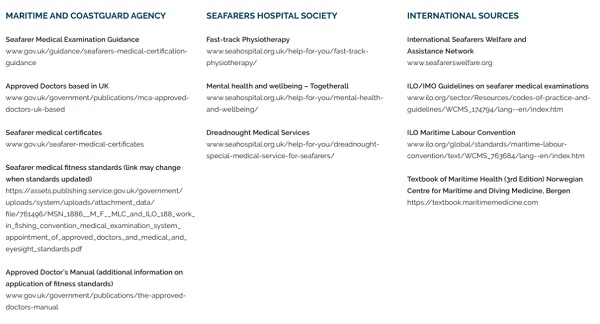SHS launches guide to aid communication between seafarers and doctors
The Seafarers Hospital Society (SHS) has launched a Seafarer Health Consultation Guide to assist interactions between seafarers and health professionals with the aim of improving healthcare outcomes and meeting the needs of seafarers.
The guide is divided into two sections. The first offers advice to seafarers on how to communicate their concerns to healthcare professionals the second offers medical professionals clinically relevant information regarding life at sea.
According to Dr Tim Carter, SHS trustee, seafarers all too often find that when they see a health professional, whether it is a GP, a hospital doctor, a dentist or another clinical specialist, there is little understanding of their special healthcare needs. These may result from periods on board when they are not available for treatment or follow-up; it may be that they need prescriptions of longer duration than normal, or it may be that they need additional immunisations.
| Read More: SMG celebrates importance of diversity and equality on IMO's International Day for Women in Maritime |
1-Guidance for seafarers
- Many of the doctors seafarers contact will have little knowledge of the working lives of seafarers, the risks these may pose and the requirements for medical fitness. You will need to come to any consultation prepared to explain these.
- You may also need to inform others who act as gatekeepers that you are a seafarer and your health care requirements can differ.
- Your concerns about health will be familiar to any doctor but the implications of these in terms of fitness for work as well as your limited availability for investigations, treatment and follow up will not.
- They will also not know about the physical and mental stresses of working at sea.
- You also need to take along clear information on your future pattern of work so, if necessary, follow up and treatment can take place during such times.
- Some medical conditions will affect your fitness to work at sea.
- You may need to return to see an MCA Approved Doctor if you develop a new illness or have any changes to an existing medical condition or its treatment. They will assess your fitness against the MCA medical standards even if your current certificate is still in date.
- If you have any medical reports or test result these should be taken with you and shown to the Approved Doctor.
- Keeping your employer informed about any recommendations for investigation or treatment, if they are understanding, can help you ensure that you can be available at the right time to keep future appointments.
"From our longstanding work with seafarers, we know of the urgent need to bridge this divide in communication between crew and their families and healthcare providers",
said Sandra Welch, CEO of the Seafarers Hospital Society
2-Guidance for health care providers
Seafarers work, often for long periods, without access to normal health care provisions. They also may perform tasks on which can put others at risk, hence they are required to meet internationally agreed medical fitness standards.
| Read More: Report: Charging recruitment fees to seafarers must stop |
A seafarer may come to see you with a health problem or concern; to receive routine treatment or preventative measures, or by referral from another health professional for diagnosis or treatment. You will need to take account of their work in prioritising and deciding on their clinical needs.
The features of seafaring that make for a special pattern of health care needs are:
- Safety-critical tasks on which the security of the vessel and other crew members may depend, such as navigating the vessel
- Emergency duties, such as fighting fires on board
- Prolonged periods at sea distant from onshore medical facilities
- Work in a wide range of climate zones
- Living and working with a small team of other crew members in a hierarchical management structure
- Flying to join a ship and being ashore in unfamiliar ports
- Exposure to injury and illness from risks on board or in port
3-Sources of information

"This new guidance for Seafarer Health is a welcome guide for a group whose healthcare needs have too often been overlooked, for a variety of reasons",
said Dr Charlotte Mendes Da Costa, a trustee of SHS since 2009
The information provided draws from SHS’ own outreach services, as well as the Maritime and Coastguard Agency (MCA), the International Labour Organization (ILO), International Maritime Organization (IMO) and International Seafarers Welfare and Assistance Network (ISWAN).
To remind, The Seafarers Hospital Society (SHS) announced earlier this month that it will provide and install 20 defibrillators in ports and seafarer centers across the UK as part of its ongoing health outreach program.
Source: Safety4sea
| Read Here | |
 |
|



































